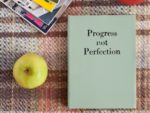Last updated on October 1st, 2023 at 01:27 pm

First, a little background
The subject of my memoir is my father, a WWII veteran. When I was growing up, he told only select stories about his time in the service. It wasn’t until he was 81 and suffering from Post-traumatic Stress Disorder (PTSD) that I began to question what he’d told me about the war. Thus began our journey.
But here’s the thing–though he started talking about his service and his WWII experiences at that time, it was a slow process–a very slow process. After repressing memories for over 50 years, one can’t expect them to spill out chronologically over breakfast effortlessly. Instead, his memories were revealed slowly, often painfully, in stops and starts, bits and pieces.
The Years That Followed Can be Broken Down Something Like This:
The first few years:
My father gave me more than 400 pages of letters he wrote to his “folks” during the war. I read them, and we started meeting to discuss the letters. Later, he slowly began sharing photos and other memorabilia.
The middle years:
The information he was sharing with me became more and more emotional. I still had a feeling he wasn’t telling me something. He’d go right up to it, then change the subject or stop talking. I knew there was more. But the more he shared, the more distraught he was becoming. I struggled with whether this was helping him or hurting him.
The last years:
I began writing my father’s story, using the letters as the foundation. My intent was to make a copy for each of my children. Though it would only be for my family, I wanted it to be the best it could be, so I joined a writer’s group. In that group, I was encouraged to write his story into a book. I began filling in the gaps that his letters left. I researched WWII and everything related to every single piece of information he’d shared. I went to a writer’s conference and met an editor from Sourcebooks.
The rest, as they say, is history.
Publishing a Book Takes as Much Time as it Takes
So, you see–saying that I was working on this book for almost ten years isn’t all that accurate. Most of those years were not spent with my rear in a chair, actually writing for hours and days, months at a time. No, writing is much more nebulous than that. This is especially true for nonfiction. And when you’re dealing with someone else’s difficult memories, it’s even more complicated.
When I speak to writers who dream of publishing a book, I find that they often want specifics. They want to know exactly how much time it took. I’ve been there too. When we ask those questions of other writers/authors questions, we really want to know if the book publishing dream is possible for us. We want to know what to do so that our writing becomes known and published. We want our writing to touch others. And we want to know the formula for making that happen.
But there’s a problem with that.
There is no formula for writing the story you were meant to write.
If it takes me almost ten years to write every book I write, I may get three books written in my lifetime. For some, that’s completely acceptable, even appropriate. For me, it’s not.
My current Work-in-Progress (WIP) is another military story. This time, it’s the Vietnam War I’m writing about. The subject is a portrait artist, Michael G. Reagan, and his miraculous experience that led him to leave everything he’d worked so hard to attain; security, a job he loved, prestige–to found the Fallen Heroes Project. I heard about Mike and met him in 2012. I began gathering information and research by the end of that year. Now, almost three years later (hard to believe!), I’m nearing the end of my part in the project–the actual writing. Then, I will move on to working with my agent on it, and after she finds a publishing house, I will work with them on it as well.
So, while my father’s book took nine years, this one will take about four years. When I first approached an agent with it, she said, “This is a huge and ambitious project.” She was right.
As I near the end of the writing portion of the book, I’m beginning to think about what’s next. While goal setting is so much a part of my life that it’s practically in my DNA, my first two projects (books) happened quite organically. But as I move forward, I feel the need to give more thought and action to goal setting.
If I want my dream career as a writer, it’s imperative that I have a plan.
Like most writers, I have stories that pop into my head all the time. Some stay for the weekend, some pop in and pop out before I can even get to know them. And then there are the ones that pull up with a U-haul and move in, holding me hostage until I meet their demands. As I contemplated this the other day, I could name six books, right off the top of my head, that have moved in. Some are fiction, some nonfiction. Some are children’s books, and others are for the adult market. But what they have in common is that I didn’t have to think hard to pull them to the forefront of my mind. So, I wrote them down. Then I opened a file on my computer labeled “Old Computer Documents.”
You see when I first started writing, I only knew that I wanted to write.
I didn’t know what genre. I didn’t know who my target audience would be. I didn’t know whether I wanted to freelance for magazines or write books. In fact, I didn’t know much of anything. There wasn’t any goal-setting involved. I just started writing. It was good therapy–but that’s another story. In that old documents file were stories – some half-hatched, others full-length books. I WAS AMAZED when I looked through all those stories a few days ago. I wrote a lot in those first few years of dreaming. Some of those manuscripts are actually quite good. Some resonated with me more than others, so I added those to my list.
Slowly, I began to see that the time for me to expand into other genres is close at hand. Excitement for the possibilities filled me. I’ve been exploring a new list-making app. So, I made a new file within the app and listed the books I wanted to write/finish. In all, there are 15 books.
Here’s the breakdown of my writing career plan
5 – Children’s Books (all categories)
10 – Books for Adults
3 – Completely written and at least partially edited
6 – Mostly written
6 – Not Written
7 – Nonfiction
8 – Fiction
I began this post by discussing how long it took me to write my father’s story (9-years). I wrote about how long my current WIP is taking (4-years). While 2-books in 13 years sounds torturously slow, I’ve come to a new conclusion.
I’m not a slow writer.
My first two books, Breaking the Code and Drawing Me Home, will always be near and dear to my heart. As I reflect on them, it’s clear that neither one could have been finished any faster. Why? Because I was given the awesome and honored responsibility of telling someone else’s story. Both of the men I wrote about are amazing examples of heroism – each in a different way. Both men experienced the trauma of war. Creating a relationship and building trust with them could not be rushed. And without those things, there is no book. What I did with each of these men was to build a bridge between me, a civilian who’s never been to war, to them–military men who had an important story to tell. That can’t be rushed.
I believe that any book you put your soul into is the same. Until it tells the story of your heart, it’s not done.
As I begin working on my writing career plan with my future books, I will give each book the same thought and consideration. It’s just the only way to be a writer that people want to read, whether the book is fiction or nonfiction, written for adults or children. As I move forward, it is with the knowledge that Story, with a capital “S,” can’t be rushed. Neither can be connecting with people and touching their lives.
———-
Here’s a step-by-step career plan to help you achieve your publishing goal
1. Self-Assessment and Goal Setting:
- Identify your specific career goals within book publishing. Do you want to be an editor, literary agent, publicist, or work in another area?
- Assess your skills, strengths, weaknesses, and areas of interest. What unique qualities can you bring to the industry?
2. Education and Skill Development:
- Pursue relevant education or training, such as a degree in English, creative writing, journalism, or a publishing-related field.
- Attend workshops, webinars, and conferences to learn about the latest industry trends and network with professionals.
- Develop strong communication, writing, editing, and project management skills.
3. Gain Experience:
- Seek internships or entry-level positions at publishing houses, literary agencies, or related organizations. These positions can provide valuable hands-on experience.
- Volunteer for literary magazines, blogs, or literary events to build your resume.
- Create your own blog or start a literary social media presence to showcase your passion for books and the industry.
4. Networking:
- Build a professional network by attending industry events, joining book clubs, and connecting with professionals on LinkedIn.
- Attend book launches, author readings, and industry conferences to meet people in the field.
- Join publishing-related associations and groups, such as the Association of American Publishers (AAP) or the Editorial Freelancers Association (EFA).
5. Specialize and Gain Expertise:
- Identify a niche or specialization within book publishing, such as children’s books, non-fiction, or academic publishing.
- Become an expert in your chosen area by reading widely, attending specialized events, and keeping up with industry news.
6. Create a Portfolio:
- As you gain experience, compile a portfolio of your work. This might include edited manuscripts, marketing campaigns, or successful book launches you’ve been part of.
- Use your portfolio to demonstrate your skills and accomplishments to potential employers or clients.
7. Seek Career Advancement:
- Look for opportunities to move up within your current organization or seek more responsible roles elsewhere.
- To enhance your qualifications, consider pursuing advanced degrees or certifications in publishing or related fields.
8. Stay Current:
- Stay up-to-date with industry trends, digital publishing technologies, and changing reader preferences.
- Continuously expand your knowledge and adapt to the evolving publishing landscape.
9. Submit Your Own Work:
- If you aspire to be an author, submit your manuscripts to publishers, literary agents, or literary magazines.
- Be prepared for rejection but persist in refining your craft and submitting your work.
10. Stay Persistent and Resilient:
- The publishing industry can be competitive, so be prepared for setbacks and rejection. Keep refining your skills and learning from your experiences.
- Stay passionate about books and publishing; your dedication will set you apart.
11. Consider Entrepreneurship:
- If you have a unique publishing idea or want to start your own publishing house, develop a business plan and explore entrepreneurial opportunities.
12. Long-Term Goals:
- Set long-term career goals, such as becoming a senior editor, literary agent with a reputable agency, or starting your own successful publishing company.
- Continuously reassess and adjust your career plan as you progress and your interests evolve.
Remember that success in book publishing often requires perseverance and adaptability. Stay committed to your passion for literature and the publishing industry, and with hard work and determination, you can achieve your dream career.
 |  |  |  |

Karen Alaniz is a writer, published author, and a home renovation expert now that she’s remodeled an old farmhouse by herself. She strives to help women who are scared it may be too late to start over after a certain age and she encourages empty-nest women to invent a new, prosperous and full life–just like she has done. You can read more about Karen on her Amazon Author page.
Note: Articles by Karen may contain affiliate links and may be compensated if you make a purchase after clicking on an affiliate link.




